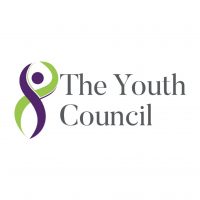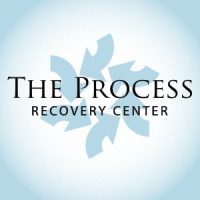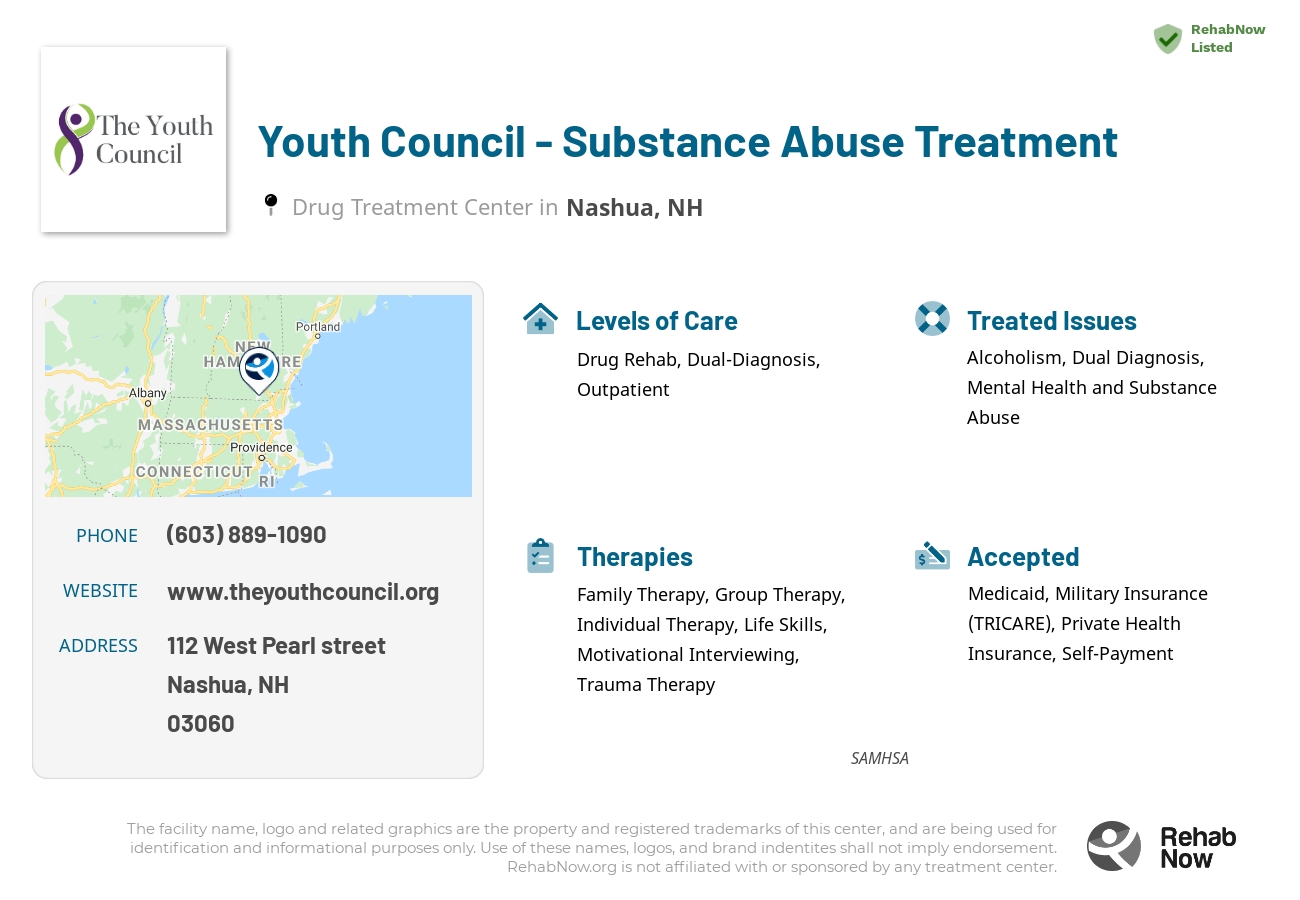
Youth Council - Substance Abuse Treatment
Drug Rehab Center in Nashua, New Hampshire
- Dual Diagnosis
- Drug Addiction
- Alcoholism
Youth Council - Substance Abuse Treatment in Nashua, New Hampshire offers a safe, holistic environment for adolescents to receive evidence-based treatment and support for addiction and substance abuse issues, all provided by highly-trained psychiatric and clinical staff.
About Youth Council - Substance Abuse Treatment in New Hampshire
Youth Council - Substance Abuse Treatment is an Addiction Treatment Facility located in Nashua, New Hampshire. Founded in 1974, this facility has been helping individuals suffering from alcoholism, drug addiction, and dual diagnosis for over 45 years. Accredited by SAMHSA (Substance Abuse and Mental Health Services Administration), Youth Council - Substance Abuse Treatment offers a range of services to address addiction, including drug rehab and outpatient levels of care. They accept private health insurance, making their services accessible to a wider range of individuals seeking treatment.
At Youth Council - Substance Abuse Treatment, individuals can expect comprehensive and personalized care for their addiction and substance abuse issues. The facility provides drug rehab programs that are tailored to meet the unique needs and goals of each individual. Additionally, they offer dual-diagnosis treatment for individuals facing co-occurring mental health and substance abuse disorders. With a focus on outpatient levels of care, Youth Council - Substance Abuse Treatment provides flexible treatment options that allow individuals to receive quality care while maintaining their everyday commitments.
Genders
Ages
Modality
Additional
Accreditations
SAMHSA
Conditions and Issues Treated
Levels of Care Offered
This center offers a variety of custom treatment tailored to individual recovery. Currently available are Drug Rehab, Dual-Diagnosis, Outpatient, with additional therapies available as listed below.
“Outpatient treatment is ideal for those who have a lower intensity addiction. It’s also suitable for those with a supportive environment and those on a tight budget.
Outpatient treatment can be considered the lowest intensity level of addiction treatment. It is ideal for early phase addiction or lower intensity addictions. It may involve weekly sessions instead of daily. Peer group support, 12-step programs, and individual counseling may still be used and anti-addiction medication.
Therapies & Programs
No single treatment works for all addicts; therefore, the goal of treatment and therapy should be to find what works best for each individual. Some people requiring addiction treatment may only need a few weeks of inpatient care. Others will require long-term residential care. Tolerance and withdrawal levels vary from person to person and thus affect the intensity of the treatment needed.
If an individualized approach to treatment and therapy is not offered, addicts may fail to reap benefits from their efforts. Professionals must customize plans according to their patient’s needs, limitations, and strengths. The goal of all forms of addiction treatment should be for addicts to find healthy ways to cope with their addiction and its underlying causes.
The therapies usually include siblings, children, and parents who are involved in their daily lives. These sessions are vital because they address past issues that may have hampered an addict’s or alcoholic’s recovery and provide support at a crucial time!
One of the most critical aspects of family therapy is helping addicts’ loved ones see their situation in a new light. It’s also one of the most challenging things a family can do when a loved one struggles with addiction or alcoholism.
Group therapy is held in a safe, controlled setting where patients can feel comfortable sharing their struggles and gaining perspective through shared conversations. It takes place in a group rather than one on one to prevent feelings of isolation or being unique in their situation while creating an environment for addicts at Youth Council - Substance Abuse Treatment to develop fellowship, accountability, and support. Group therapy is an important tool in recovery that prevents cravings that prompt a return to active addiction.
This type of therapy involves the use of a variety of therapeutic techniques to help addicts recover from past traumas that might have triggered their substance abuse. During these sessions, therapists will work with the addict to address painful memories and learn how to cope effectively with stressors as they arise.
During these types of sessions, therapists will typically focus on three main goals:
- Identifying and expressing painful emotions associated with past traumas.
- Reducing the effects of stress on an addict’s life by developing more effective coping mechanisms.
- Developing healthy ways of thinking about stressful situations that can help addicts avoid substance abuse issues in the future.
This type of therapy is typically used in conjunction with other types of addiction treatment services. By identifying and dealing with the root cause of addiction, most addicts can overcome their cravings and prevent relapse once they leave rehab.
Many different types of addiction treatment services exist to help addicts safely get sober, but it’s important for recovering individuals to find a therapist or support group that will help them address the root cause of their addiction.
Cognitive-behavioral therapy is a talking-based method that helps people struggling with addiction replace destructive behaviors with healthier ones. CBT also helps them identify the underlying thoughts and beliefs that cause these behaviors in the first place and ways to control those thoughts and feelings. It can be administered as a holistic therapy or as part of combination therapy and—as opposed to turning to drugs and alcohol—helps addicts learn how to respond to negative thoughts instead.
Life skills training is beneficial for addicts in recovery because it helps them learn how to take care of themselves and improve their quality of life, which can promote feelings of purpose and motivation.
This type of treatment works by teaching individuals life-enhancing skills that support positive living, including:
- Healthy lifestyle habits
- Skills to effectively manage stress
- Effective communication skills to help them get their needs met without turning to drugs or alcohol
- Money management and budgeting skills so they can continue to take care of themselves after treatment ends.
Payment Options Accepted
For specific insurance or payment methods please contact us.
Is your insurance accepted?
Ask an expert, call (888) 674-0062
Additional Details
Specifics, location, and helpful extra information.
Nashua, New Hampshire 3060 Phone Number(603) 889-1090 Meta DetailsUpdated November 25, 2023
Staff Verified
Youth Council - Substance Abuse Treatment Patient Reviews
There are no reviews yet. Be the first one to write one.
Nashua, New Hampshire Addiction Information
Opioids such as fentanyl, heroin, and prescription opioids form the largest drug threat in New Hampshire. More than 80% of all New Hampshire treatment centers admissions were related to one or more of these three drugs. Opioids such as fentanyl, heroin, and prescription opioids form the largest drug threat in New Hampshire. Since 2002, rates of alcohol dependency have also been among the highest in the country. In 2015, almost 15% of the residents were admitted to treatment centers for alcohol abuse.
The addiction problem in Nashua, NH, is a serious issue. Poverty can also be a factor for children who grow up in households where both parents are addicts. In 2012 there were 330 arrests for the sale of heroin and morphine. In 2012, there were 1,459 emergency room visits due to illegal drug use in Nashua, NH. The common drug treatment program in Nashua is an outpatient program.
Treatment in Nearby Cities
- Seabrook, NH (31.8 mi.)
- Dublin, NH (31.9 mi.)
- Dover, NH (42.7 mi.)
- Suncook, NH (25.7 mi.)
- Hudson, NH (1.4 mi.)
Centers near Youth Council - Substance Abuse Treatment


The facility name, logo and brand are the property and registered trademarks of Youth Council - Substance Abuse Treatment, and are being used for identification and informational purposes only. Use of these names, logos and brands shall not imply endorsement. RehabNow.org is not affiliated with or sponsored by Youth Council - Substance Abuse Treatment.







